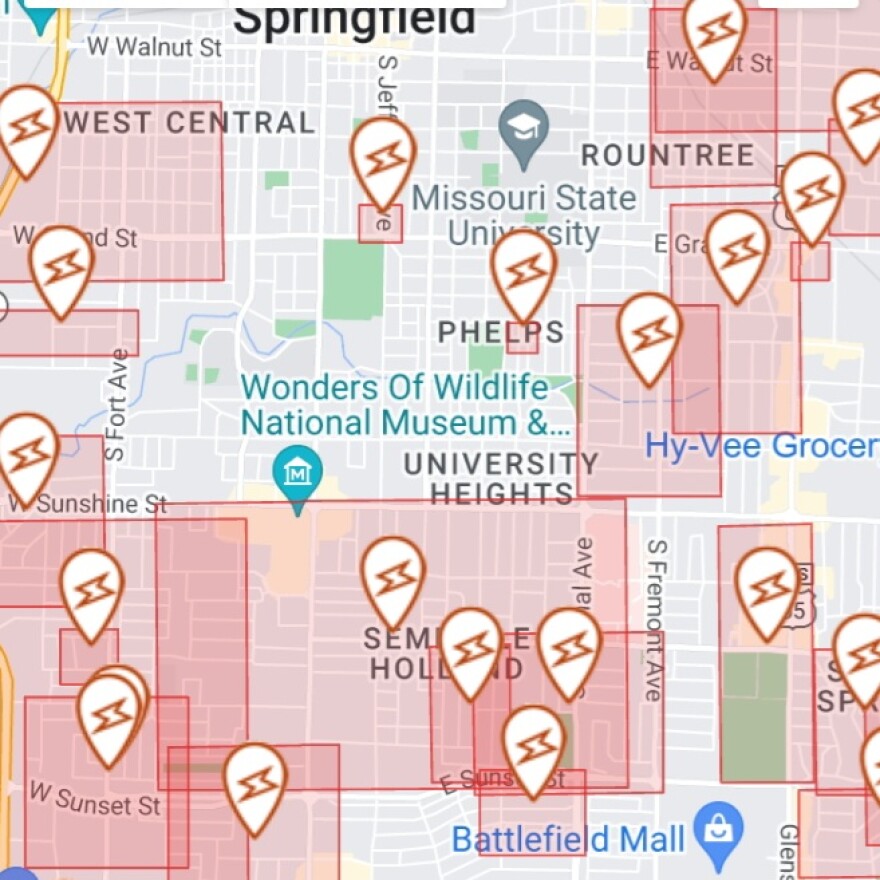A surprisingly strong late night storm swept through the Ozarks late Sunday and into early Monday morning.
The storm brought strong winds and gusts up 70 miles per hour, per a press conference with City Utilities Manager of Media Relations Joel Alexander. Alexander said over 15,000 residents were without power at the peak of outages, and 8,000 were still without power at noon Monday.
Alexander said this is the worst outage in the city in eight to 10 years. He estimated it may take 48 hours to get the majority of remaining customers back online, though home damage may leave some without power longer. City Utilities asked that residents continue to report outages. View a current map of outages here.
Early Monday morning, Liberty Utilities, which serves much of the Ozarks, reported 29,000 without power at the peak, mostly in the Ozark, Branson and Aurora areas.
As scorching temperatures continue this week, and with many still without power due to the storms, the Springfield-Greene Health Department is reminding of the dangers of heat. A heat advisory is in effect for parts of the Ozarks Monday and Tuesday, including Springfield. Areas to the west are under an excessive heat warning. Health department officials said many people who lost power during the storms could experience heat-related illness at home.
Heat exhaustion is the most common heat-related illness and can lead to dehydration, according to the health department. Symptoms include heavy sweating, paleness, tiredness, muscle cramps, weakness, dizziness or fainting, headache, nausea or vomiting. A person with these symptoms should move to a cool spot, rest and drink cool water. If symptoms worsen or last longer than an hour, they should seek medical attention.
Heat stroke occurs when the body’s temperature climbs to or above 104°F. It can be deadly. Call 9-1-1 immediately if a person has symptoms including a high body temperature, red, hot or dry skin, rapid pulse, throbbing headache, dizziness, nausea, confusion or unconsciousness.
Heat exhaustion and heat stroke occur when the body’s temperature control system is overloaded. Children, older adults and people with chronic illness are at highest risk.
Tips to protect people against heat-related illness, according to the health department:
- Drink plenty of water, even if you do not feel thirsty; avoid drinks that contain alcohol or caffeine. Also, avoid very cold drinks because they can cause stomach cramps.
- Avoid strenuous work or exercise outside during the hottest part of the day. If that is not practical, take frequent breaks and remember to drink plenty of water. This includes cleaning up after last night’s storm. If it is not blocking roads and driveways or posing some other kind of safety hazard, leave clean up to cooler parts of the day or for once you have power restored to your home.
- Wear lightweight, light-colored, loose-fitting clothing.
- Never leave anyone in a closed, parked vehicle. Including pets.
A map of public cooling centers, public buildings with air conditioning and water-refill stations is available at health.springfieldmo.gov/heat.
If you have family members, friends, neighbors, or other acquaintances who are without power and air-conditioning, please consider offering shelter to them — especially children, older adults and those with chronic health conditions. If you have older neighbors who live alone, consider checking on them periodically to ensure that they are safe, SGCHD officials said.
If you see a child, pet or unresponsive adult outdoors or in a closed, parked vehicle, immediately call 9-1-1.
In order to avoid foodborne illness, according to the health department, it is important that frozen and refrigerated foods be kept at appropriate temperatures. If you have an appliance thermometer in your refrigerator or freezer, use it to ensure that food is being stored at safe temperatures throughout the power outage (34 to 45ºF for the refrigerator; 0ºF or below for the freezer).
A full freezer should keep food safe about two days if it is left closed. You can add bags of ice or dry ice to the freezer if it appears the power will be off for an extended time. Refrigerated foods, however, may not be safe after about four to six hours. Any perishable food that has been above 45ºF for two hours or more and any food that has an unusual odor, color, or texture must be discarded. If it appears the power will be off more than six hours, transfer perishable foods to an insulator cooler filled with ice or frozen gel packs. Keep a thermometer in the cooler to be sure the food stays at 45ºF or below.
Foodborne illness can lead to symptoms like nausea, vomiting, and diarrhea. These symptoms may last only 24 hours, or they may become severe and lead to hospitalization, or in extreme cases, death. If you experience these symptoms for more than 24 hours, please contact your health care provider. Foodborne illnesses can be more severe in young children, the elderly, and in people with a compromised immune system.
For more information on staying safe in the heat, visit health.springfieldmo.gov/heat. More information on food safety during power outages can be found at health.springfieldmo.gov/2897/Food-Safety.



